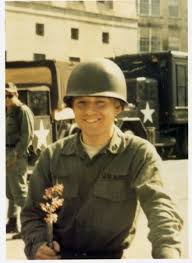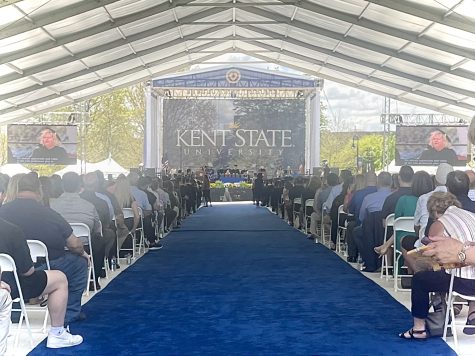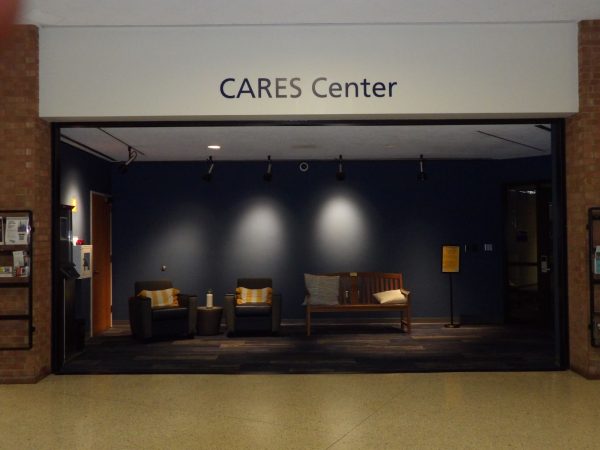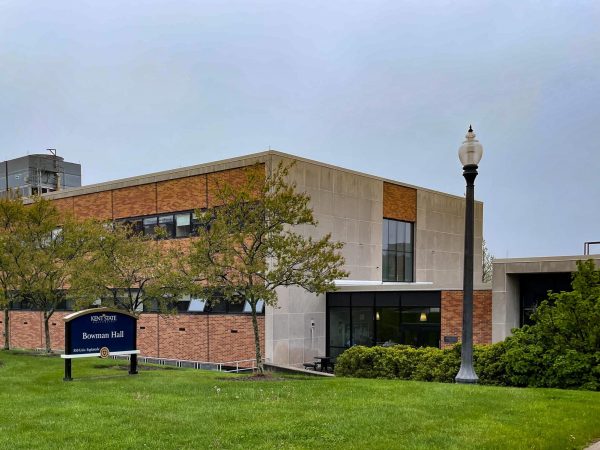Poet shares experiences that shaped her work
October 16, 2008
Toi Derricotte introduced guest speaker Djelloul Marbrook, author of the poetry book Far From Algiers last night in the KIVA. She later also read poetry. Shaye A. Painter | Daily Kent Stater
Credit: DKS Editors
Shame is what keeps people from speaking about racial divisions.
“Often silence is about shame, but as long as we are silent, nothing changes,” poet Toi Derricotte said. “You break (silence) by saying the truth.”
Derricotte shared her experiences as a light-skinned black teacher and student yesterday in a presentation sponsored by the Wick Poetry Center.
Derricotte said her passion is to write about the community that she always felt she needed to be part of. The poet said while she was a student in college, she constantly felt discouraged because she never read anything by a black poet during her early school years.
“When I asked a professor why, he said, ‘We haven’t gone down that low,'” Derricotte said.
Derricotte said she believes writing poetry can be a life-changing experience, as she proceeded to read a poem from a 12-year-old student who found his mother dead in a parking lot.
“Pain is to feel with fear
sight is to see things you never saw before,
hear is to hear sound to develop feeling,
feel is to touch with fear.
Pain is to feel with fear
sight is to see things you never saw before,
hear is to hear sound to develop feeling,
touch is to feel with feeling.”
For Derricotte, writing poetry is a natural impulse in humans.
“Poetry is a great gift, and I think it is like desiring sex or desiring food,” Derricotte said. “It is an internal desire to express things.
“Writing a poem is a power that no one can take away from you. You cannot have money, but if you want to experience power, write a poem.”
She said her purpose is to remind people they should ignore the negative criticism their poetry may receive. Derricotte said people find it more difficult to write poetry as they grow up.
The poet said people often repress their desire to write poetry because they believe they are not good enough.
“They squash it, and that’s another way of silencing something that belongs to you,” Derricotte said. “You’re silent, you’re ashamed, you can’t write a poem. ‘Oh, only white people write poems.”‘
For Maggie Anderson, director of the Wick Poetry Center, issues that are not often spoken become taboos that later create tension and misconceptions.
“It’s very difficult to talk across the races,” Anderson said. “For a white person and an African-American person or a white person and a Japanese person, it’s very difficult to have a conversation about race and what it is meant for them in their lives.”
During the presentation, the poet asked the audience to express the age in which they consciously realized their race. The majority became aware of it during their childhood years.
Junior English major Maggie Marniella said she believes this is one of the reasons racism still exists.
“You find out in such an early age that how are you not supposed to separate yourself from others if that’s what they’re talking when you’re growing up,” Marniella said. “Segregation may not be intended but it’s still there.”
Besides her presentation, Derricotte, author of “The Black Notebooks: An Interior Journey,” also took part in a reading.
Contact minority affairs reporter Regina Garcia Cano at [email protected].























